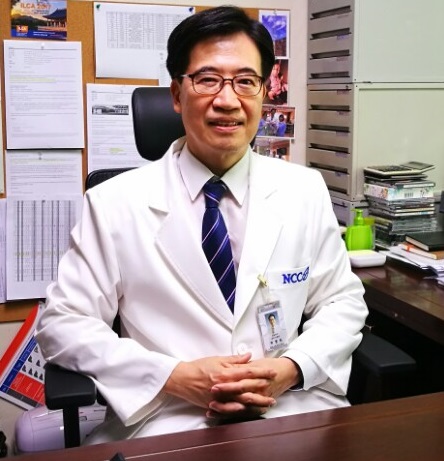“Early detection of liver cancer in Korea is only one fourth of those in Japan,” says Park Joong-won, chairman of the Liver Cancer Association, who has hopes in immune checkpoint inhibitors
Liver cancer, one of the four deadliest cancers in Korea, is called a "silent killer" because the diagnosis and the treatment are tricky.
Incidence rate of Hepatitis B, which has been cited as one of the major causes of liver cancer, has been significantly reduced due to the improved vaccination and treatment. But how come the incidence of liver cancer and the follow-up reduction in deaths have fallen short of expectations?
I visited the National Cancer Center (NCC)국립암센터 to interview Park Joong-Won박중원, a nationally renowned liver cancer expert, for an explanation to the question above and the best possible liver cancer treatment. Professor Park has been serving as chairman of the Liver Cancer Association since July.
Question : Why is there not a significant change in the prevalence of liver cancer, despite the reduction of hepatitis B?

Answer: According to WHO statistics, the incidence of liver cancer per 100,000 people is the highest in Mongolia. Laos comes next and South Korea ranks at fourth. China is at the 6th place and Japan at the 10th. As you can see, the incidences of liver cancer are concentrated in Asia. The biggest reason is that there are many patients with hepatitis B in Asia, and those with hepatitis C in Japan.
Treatment of hepatitis B results in smaller incidence of liver cancer by more than 50 percent. In Korea, however, even though the number of patients suffering from hepatitis B has decreased, there are no significant changes in the number of liver cancer patients. My personal guess is that as the treatment of the hepatitis B improves, the number of elderly patients also increases. So, the increasing number of elderly patients, with metabolic diseases such as diabetes and obesity, along with alcohol related illnesses, is the reasons for the still high number of liver cancer patients.
Q: How can you explain a situation where a patient develops liver cancer even though his/her hepatitis B treatments were going well?
A: Unlike herpes, hepatitis B virus is not classified as a disease that causes cancer. However, the hepatitis B virus damages the tissues and develops chronic inflammation, which can lead to cancer with the damaged tissues growing old.
Q: Liver cancer does not have many newly developing drugs compared to other cancers. Why is that?
A: Two new drugs have been created recently for liver cancer. Regorafenib, which is a treatment for patients who failed with Sorafenib medication, was granted permission in Korea at the end of last year. In June, Lenvatnib was clinically tested against Sorafenib at the American Society of Clinical Oncology (ASCO) and proved noninferior to Sorafenib. Earlier, a number of other drugs were created to treat liver cancer but most of them failed.
Q: Why is it so difficult to develop new drugs for liver cancer?
A: Once patients get diagnosed with liver cancer, it is difficult for them to tolerate stronger drugs than those administered for other cancer patients because the ill liver is key for metabolism. Another problem is that the liver cancer is biologically not a single tumor. If a patient is diagnosed with liver cancer, this means that, biologically, different kinds of cancers, with the same shape, come together to shape a liver cancer. Due to his biological diversity, it is difficult to use a single medication to treat liver cancer.
Q: Recently, immune checkpoint inhibitors are gaining a lot of attention. Can they help treat liver cancer?
A: I think the expression of “nearly there” is apt. Nivolumab went through second-phase clinical trials for liver cancer patients to identify the efficacy and safety of the drug. With this, even the US FDA is examining to prescribe Nivolumab for patients who failed with Sorafenib. The third-phase clinical trials are expected to be announced in the first half of next year. Personally, I have high expectations on this because I serve as one of the Asian advisors on the third phase of the clinical trials.
Q: What are your future plans as the chairman of the Liver Cancer Association?
A: I will make efforts to detect liver cancer early through regular medical checkups. If it is detected early, liver cancer has high survival rate. But Korea has lower rates of early detection compared to Japan and Taiwan. In Japan, 50 percent of patients with liver cancer are detected during the early stages, but such rate in Korea is only one quarter to Japan. So, we plan to aggressively promote the importance of early detection through PR activities. We plan to revise the guidelines and publish them by the first half of next year.
There are also plans to improve the quality of the ultrasound. In Japan, patients with severe liver cirrhosis are supported by government-funded CT and MRI scans. Japan selectively manages and treats patients with liver cancer.
We also need this kind of support and activities. It is also possible to introduce a voucher system that enables patients with hepatitis B or cirrhosis to proactively prevent liver cancer through early examinations and regular tests.
Last, we need a strong warning on alcohol. Korean people are easily exposed to alcohol, often from young age, and rules are too lenient. Koreans need to be continuously enlightened on these issues.

